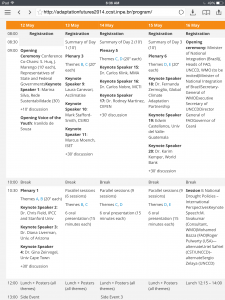 I'm posting after 15 May because fact-checking was needed!
I'm posting after 15 May because fact-checking was needed!
On Monday 12 May 2014, Marina Silva, the former Brazilian Minister of the Environment under President Lula, who is currently running on a Presidential election ticket with Eduardo Campos, as candidate for Vice-President, gave the opening speech, in Portuguese at the 3rd Adaptation Futures Conference in Fortaleza, Brazil.
Here’s her speech, reconstructed from my notes of the simultaneous English translation, and compared with the notes of Prof. Ellie Perkins, Faculty of Environmental Studies, who is fluent in Portuguese.
“We need to think about the overall state of the environment, not just about the climate: there are other aspects of the global ecology crisis.
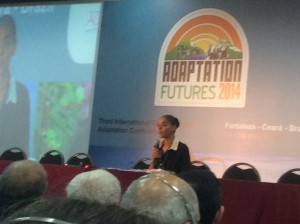 We must think about the Crisis of Civilization: the Civilization Crisis which is affecting the balance of the planet. We need a different development model, because the current development model is not sustainable. This new development model sees sustainability as a world view and life ideal. It will give us the strength of attitude and mind to do what must be done.
We must think about the Crisis of Civilization: the Civilization Crisis which is affecting the balance of the planet. We need a different development model, because the current development model is not sustainable. This new development model sees sustainability as a world view and life ideal. It will give us the strength of attitude and mind to do what must be done.
In the French revolution, the slogan, “Equality, Liberty, Fraternity” enabled a new cradle of civilization to be forged that some people may consider has led us to the edge of a cliff. But, it has also led us to the gate of new possibility.
Let me tell you about the Civilization Crisis. It has five (5) dimensions:
1. The Economic Crisis. Since 2008, we have been experiencing the consequences of a global recession.
2. The serious Social Crisis. There are 7 billion people, 2.4 billion of whom lived on less than USD $2/day in 2010.
3. The Environmental Crisis. Climate Change is just one aspect of this, which also includes pollution.
4. The Political Crisis. Globally, people are demanding participation. At the time of the American and French revolutions, there were 1 billion people on the earth. Communication through the form of printed paper allowed the ideas of those revolutions to spread.
Today, 7 billion people have the internet to enable their communication. We must find new ways of undertaking democracy which transcends the kind of democracy that functions through unions, universities and other organizations. We must democratize democracy. This prospective democracy is about direct people-to-people connection and communication through the internet.
We must also remember that democracy has meant different things at different times. For example, Greek democracy was not for women and slaves but for men. Freedom and democracy came much later for women and slaves.
Some people are afraid of new kinds of democracy and of the emergence of new political protagonists who participate in democracy through their direct actions as individuals. A new political subject is emerging in the world. This is a new form of activism: that of the individual protagonist or mobilizer. But, in this, we must also consider what it means for the group and what the group or collective values should be.
5. The Values Crisis. By this, I don’t mean theistic (religious) values but ethical values. I am also talking about clinical values [Dawn Bazely took this to mean values of rational and more “scientific thinking”]. For example, taking fever medicine when you have an infection – treating the symptom but not the underlying disease -- is not a clinical attitude.
Despite the scientific data and evidence, we continue to behave unsustainably. We need to adopt the precautionary principle. We cannot ignore the precautionary principle as the key to thinking sustainably and ethically.
So, the Civilization Crisis has five parts: Economic, Environmental, Social, Political and Values. If we look at past civilization collapses due to crises, we see that when a civilization failed, most people died but some survived and moved on to another place. Today, due to the integration of climate change impacts across the globe, no one can hide from what is happening.
It is estimated that there are 40 civilizations in Brazil that have never been contacted, but they, too, are affected by this Civilization Crisis; they cannot hide from it.
We need to adopt more evidence-based clinical attitudes. It is not enough to simply know about climate science and future projections. We must act. Adaptation means the re-prioritizing of our actions.
I am neither an optimist nor a pessimist. We must try to balance ourselves on the tightrope and for this, we need persistence, not optimism nor pessimism. For example, Brazil was the first Global South country at COP15 to commit to reducing GHG emissions with legislation, and we did this, but now, emissions are growing again.
So, a new model is needed for sustainable development. The United Nations recognizes that there are four (4) dimensions of sustainability to take into account:
1. Economics: the need for redistributing wealth.
2. Ecology: the wise use of resources.
3. Cultural diversity and inclusion is key in building sustainability.
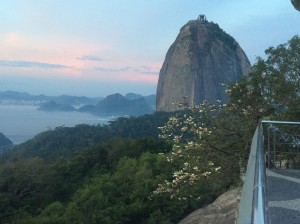 4. The preservation of history and heritage is also key. For example, Sugarloaf Mountain in Rio is a fixed point in our history and must be preserved.
4. The preservation of history and heritage is also key. For example, Sugarloaf Mountain in Rio is a fixed point in our history and must be preserved.
In moving to a sustainable model, politics must recognize that the Civilization Crisis must be faced by all members of society – at once, simultaneously.
So, in Brazil, where corruption issues make us all very uncomfortable, we must acknowledge that corruption is not only Lula or Dilma’s issue. Corruption is endemic in all governments and everyone must own the issues of corruption.
What does this mean? Well, when social exclusion became the issue of everyone in Brazil, 30 million people could be freed from poverty. Unlike a dictatorship ruled by a tyrant, democracy means the inclusion of everyone in an ethical manner. So, the politics of democracy requires a cultural shift in which no one person leads from the top.
To do this, there must be an ethical commitment to translating the science and knowledge into public policies that lead to action. In this, we must be interdisciplinary in our approach.
Humanity has made a black hole of consumption for ourselves so that we are not actually suffering from a lack of material, but from an excess.
This means that we must confront not our failure, but our success; we have constantly overcome obstacles and have expanded our civilization, consuming more and more (this reminds Dawn of the plot of the movie, Independence Day – the invading insectoid aliens do this to every planet that they encounter: they are a metaphor for humanity!).
The questions that we must ask ourselves are:
“Who are you?” “Who do you want to be?”
My answer is: “I want to be sustainable”.
So, in answer to the question: “Are you left-ring or right-wing?” I say: “I am a progressive sustainability thinker”.
I know that Adaptation Futures is mainly a meeting of scientists and I am not one. Neither am I a political scientist. I am just here to give my reflections and thoughts about this new political subject and movement. We need an anchor, not a port to shelter us from the effects of climate change. Each of us has our anchor and from this anchor, we try to fly.
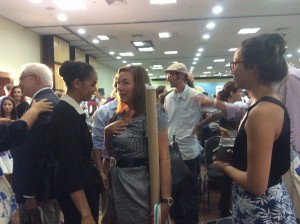 We need science, for example, to be able to develop renewable energies, and from this we must develop a new platform or surface to support sustainability. We must be militants for a civilization that uses science as a terms of reference that allows the integration of tradition and modernity. Knowing the ball’s trajectory doesn’t mean we know how to play the [football] game. We must listen to each other. Our social ties create the capacity to allow us to work for the future, while living in the present and thinking about our past history and heritage.
We need science, for example, to be able to develop renewable energies, and from this we must develop a new platform or surface to support sustainability. We must be militants for a civilization that uses science as a terms of reference that allows the integration of tradition and modernity. Knowing the ball’s trajectory doesn’t mean we know how to play the [football] game. We must listen to each other. Our social ties create the capacity to allow us to work for the future, while living in the present and thinking about our past history and heritage.
Thank you."
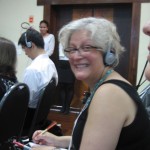 Here I am madly taking notes while listening to the simultaneous translation.
Here I am madly taking notes while listening to the simultaneous translation.
Dawn Bazely


Comment on “Marina Silva's opening speech at 3rd Adaptation Futures conference, Brazil”